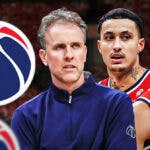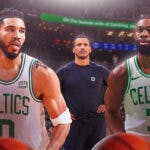Historically speaking, whatever the Washington Wizards have been doing hasn’t been working, at least since 1979. The franchise—over its many iterations as the Chicago Packers (est. 1961), Zephyrs, Baltimore Bullets (est. 1963), Capital Bullets (1973), Washington Bullets (1974), and Wizards (1997)—hasn’t appeared in the NBA Finals since 1979, and has just one championship to its many names, coming in 1978.
In the 1970's, the Bullets—led by Hall of Famers Wes Unseld and “The Big E” Elvin Hayes—reached four Finals (1971, 1975, 1978-79) and won six division titles. Since that decade, the Bullets/Wizards can claim just one division title (2017). Instead, the franchise has been associated with playoff disappointments, bad luck, front office mismanagement, and regrettable rebrands.
In terms of acquiring talent and the occasional star, Washington has found more success via the draft and trades than free agency, though the bar is relatively low in all aspects. However, the franchise has overseen a few shrewd signings here and there.
Before Washington faces a critical 2020 offseason, let’s revisit the five best free agent signings in the history of DMV professional basketball.
5. Paul Pierce (2014)
After 15 seasons with the Boston Celtics and one with the Brooklyn Nets, Pierce signed with the Wizards on a two-year, $11 million deal in 2014. At age 36, Pierce was long past his prime, but aimed to provide the glue and experience to help push Washington deeper in the playoffs.
Pierce started 73 games in 2014-15 (11.9 points per game), then 10 more in the playoffs (14.6 PPG). He averaged 15.5 PPG on 57.6 percent shooting in Washington’s first-round sweep over the Toronto Raptors, helping lead the Wizards to their second consecutive appearance in the Eastern Conference semifinals.
The Wizards ultimately fell in six games to the Atlanta Hawks, but Pierce nearly extended the season with a would-be buzzer-beater in Game 6. Earlier in the series, he “called ‘Game.'”
After one season in D.C., the 10-time All-Star declined the second year on his deal to sign with his hometown Los Angeles Clippers.
4. Larry Hughes (2002)
Hughes signed with Washington on a three-year, $15 million deal prior to the 2002-03 season.
After one awkward season with Michael Jordan, Hughes played the best basketball of his career with the Wiz, as the defensive-minded combo guard was the perfect complement to Gilbert Arenas. He averaged 17.7 points and 1.9 steals per game in Washington. In the team's run to the second round in 2005, Hughes put up 20.7 points, 7.1 rebounds, and 2.0 steals per game.
He led the league in steals (2.9) in 2003-04, earning a spot on the All-Defensive First Team … and an ill-fated $70 million contract with the Cleveland Cavaliers.
3. Bernard King (1987)
King won the scoring title with the New York Knicks in 1984-85, but the Hall of Famer suffered a devastating knee injury that nearly ended his career—and seemed to completely halt his prime. King played just six games in 1986-87, prompting New York to release him.
King signed with the Bullets ahead of the 1987-88 campaign, and surprised the basketball world with his productivity and availability over the next four seasons. King averaged 74 games per season in Washington, scoring 22.0 points per game.
In 1990-91, at age 34, he averaged 28.4 points and made his first All-Star team since 1985. Overall, he made about $10 million over six years in D.C.
2. Gilbert Arenas (2003)
Arenas was an under-the-radar electric player in his first two seasons with the Golden State Warriors, winning Most Improved Player of the Year in 2002-03 while feeding bounce alley-oops to Jason Richardson. In the summer of ‘03, Arenas signed a six-year, $60 million with the Wizards—an absolute bargain, at least for the first chunk of the deal.
Agent Zero made three All-Star teams (2004-06), averaged 26.2 points and shot 36.4 percent from 3-point range in his first four years in D.C. In 2005, he led the franchise to its first postseason berth since 1997, then famously dueled with LeBron James the following playoffs, averaging 34.0 points, 5.5 rebounds, and 5.3 assists in the Wizards' six-game first-round loss.
Agent Zero, the Hibachi, became a fan-favorite, clutch-shot artist, and one of the most exciting and unpredictable players in basketball—and certainly in Wizards history.
Knee woes limited Arenas to just 15 games over the final two years of his contract, yet the Wizards inexplicably re-signed him to a lucrative six-year, $111 million deal. It would end disastrously—though it could have been much, much worse.
1. Bob Dandridge (1977)
The Bullets were the NBA's winningest team of the 1970's, though they lost twice in the Finals, first to the Milwaukee Bucks in 1971, then to the Warriors in 1975. In the summer of '77, the Bullets acquired one of the All-Stars from that ’71 Bucks team, Bob Dandridge, to take them to the next level.
“I constantly read in the paper that Bobby Dandridge, who was playing for Milwaukee, really could guard Dr. J,” then-Bullets GM Bob Ferry recalled. “We had to play Philadelphia to get anywhere we wanted to go. Bobby D was going to be a free agent, and I just got on my high horses and said we needed to get him to get to the next level.”
Dandridge joined forces with Hayes, Unseld and three-time All-Star Phil Chenier, and the team reached two Finals.
“He was the last piece,” then-Bullets forward Mitch Kupchak said of Dandridge. “That was the one area that management felt we needed a veteran and bringing Bobby in was just a huge addition to the team.”
Dandridge was a versatile wing who could guard multiple positions and affect the game in myriad ways. During his four-year stint with the Bullets, he averaged 18.3 points, 5.5 rebounds and 4.0 assists and made one All-Star team.
In 1978, he outscored Julius Erving in the conference finals (22.8 PPG to 21.5 PPG). In Game 7 of the 1978 Finals against the Seattle SuperSonics, Dandridge slammed home the title-clinching dunk.




